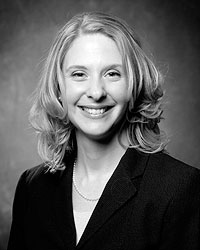Showtime for UAB's New Opera Director
By Caperton Gillett
Kristine Hurst-Wajszczuk, D.M.A., has been on stage since she was 14. She has sung with choirs in the United States and Europe under the baton of conductors such as Leonard Bernstein and Riccardo Muti. She has performed roles in Poulenc’s Dialogues of the Carmelites and Mozart’s Cosi fan tutte.
Not bad for a soprano who once suffered such debilitating performance anxiety that she devoted her doctoral dissertation to the subject.
 Kristine Hurst-WajszczukNow Hurst-Wajszczuk is sharing her expertise in vocal performance—and stage fright—with UAB students. The new assistant professor of voice and opera in the Department of Music is also the director of UAB Opera, the university’s student opera company. Its most recent production, Hurst-Wajszczuk’s first as director, was Gilbert and Sullivan’s The Pirates of Penzance. This rollicking comic masterpiece is also the first in a rotating series of operas designed to expose music students to the full history of operatic styles during their time at UAB.
Kristine Hurst-WajszczukNow Hurst-Wajszczuk is sharing her expertise in vocal performance—and stage fright—with UAB students. The new assistant professor of voice and opera in the Department of Music is also the director of UAB Opera, the university’s student opera company. Its most recent production, Hurst-Wajszczuk’s first as director, was Gilbert and Sullivan’s The Pirates of Penzance. This rollicking comic masterpiece is also the first in a rotating series of operas designed to expose music students to the full history of operatic styles during their time at UAB.
Completing the Cycle
The four-year plan that Hurst-Wajszczuk has laid out will lead her students through the developmental phases of opera, from Baroque works of the 17th century through classical, romantic, and contemporary operas in various languages. The rotation includes operettas such as Pirates that fill a vital niche in introducing students to the form: “something funny and in English,” says Hurst-Wajszczuk.
In addition to introducing students to opera’s rich history, Hurst-Wajszczuk hopes to expose them to modern works. “In the 20th century, we had 12-tone operas that didn’t sound, to our ears, like music,” she says. “We had opera for television, post-romantic opera, and minimalist opera with Philip Glass.”
Novels such as The Great Gatsby have influenced modern opera, as has modern technology, with the operetta Sweeney Todd recently produced as a Hollywood spectacular. And Hurst-Wajszczuk wonders if this influence may begin to work both ways. “A composer might be inspired by a movie and write an opera about it,” she says. “It would be interesting to see if we find cross-pollination in that direction.”
Lightning Strikes
Hurst-Wajszczuk got her first taste of vocal performance at age 14, when she auditioned for a high-school production of Annie. She had never had any vocal training, but she got last-minute coaching from a few helpful seniors and learned to project for the first time. “I remember standing on the stage and hearing my voice come back at me, and it was like a lightning bolt,” she recalls. “I said to myself, ‘This is what I want to do for the rest of my life.’”
She went on to study vocal music at Westminster Choir College in Princeton, New Jersey, and has since performed in Europe and taken lead roles in operas and oratorios across the United States, yet Hurst-Wajszczuk came to realize that her interest in music extended beyond her own performances. “I really did love it,” she says, “but I wanted to leave more of a legacy than that. And I felt that teaching was truly my calling; developing the next generation of musicians was more important than doing it myself.” The desire to teach led her to the University of Colorado-Boulder, where she received her doctor of musical arts degree, and ultimately to the opera program at UAB.
Gesamtkunstwerk
The great thing about opera, Hurst-Wajszczuk says, is that it is “the ultimate synthesis of art forms,” incorporating music, drama, dance, and visual arts. She uses words such as Gesamtkunstwerk (Richard Wagner’s characterization of opera as a “total art work”) when she talks about working with the music and theatre departments to produce Pirates. “Everyone is really ready and willing to help and share their expertise,” she says. The great thrill of her own role, she says, is helping these parts merge into a harmonious whole.
“It’s always interesting to see how all of the elements fit together to create something, and it’s always slightly different from what you envisioned. It’s always better and different and more creative than one person can ever imagine.”